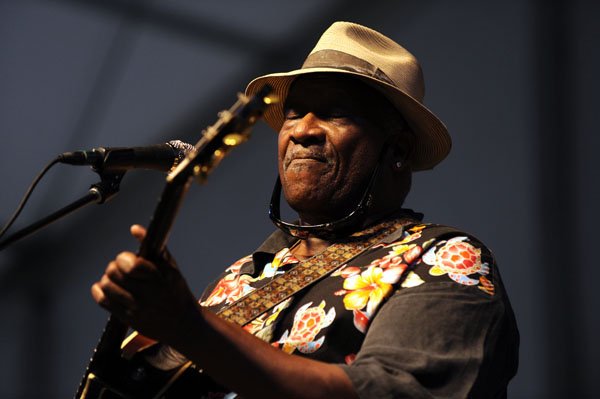Growing up as a music fan, I had always heard about the ill-fated Rolling Stones "Rock And Roll Circus" film from 1968. For some unknown reason, The Stones did not want this footage to be released for many years with the only clear explanation being they were unhappy with their performance. Like most unreleased music projects, legend grew around it.
Finally, in the mid '90s, the show was released on DVD. The second musical act in the film is a three-man group playing a heavy groove that sounds very similar to "Gimme Some Lovin.'" Center-stage stands a dapper fellow wearing a red bandana scarf, cowboy hat and round sunglasses. He steps up to the microphone and sings over the top of this beat: "You got to dig it, baby. This is Taj Mahal."
Taj Mahal grew up in what seems like the most remote area for blues music: Springfield, Mass. He attended college at the University of Massachusetts with plans to become a farmer. His father was a jazz pianist from the West Indies, and his mother sang in a gospel choir. His father worked with the likes of Ella Fitzgerald, and Taj Mahal was exposed to many styles and genres of music while growing up.
As an artist, Taj was uninterested in simply carrying on the traditions blues artists set before him. One listen to his early albums released on Columbia Records reveals a wide variety of influences and styles. Taj Mahal would not be content to sing the usual blues fare about feeling bad and lost or stolen love. Taj Mahal has no boundaries when it comes to the material he chooses to perform. In addition to using standard rock instrumentation like guitars and drums, he also relied on more exotic sounds like sitar and djembe percussion. Because of this, Taj Mahal is seen as an early innovator in what has become world music.
The bluesman moved to Hawaii in the early '80s, where he played music with group of fishermen he later called his Hula Blues Band. Mixing blues with Hawaiian styles rejuvenated him to get back into live music. During the '90s, he recorded for some smaller labels, releasing albums of more traditional blues, rock and pop, and collaborating with the likes of Eric Clapton and Etta James.
The past decade saw Taj Mahal expanding the vocabulary of blues music yet again by recording albums with African and Indian roots. During this time, he formed the Taj Mahal Trio seemingly for the sole purpose of exploring different varieties of world music.
Listening to Taj Mahal's recorded output from the last decade, you may find yourself immersed in sounds as diverse as traditional blues and R&B to island and Indian music. He also won two Grammys over the last decade.
A college-educated musician from Massachusetts seems about as far removed from the Delta cotton fields and juke joints as oil and water, but I imagine that's just the way Taj Mahal likes it based on his unflinching desire to not allow blues music to simply stay the same. Taj Mahal appears to have his eyes constantly looking ahead while keeping his feet firmly planted in the rich traditions born right here in Mississippi.
The Taj Mahal Trio will bring its particular brand of the blues to Fondren's Duling Hall (622 Duling Ave., 601-351-9999) May 29 at 7:30 p.m. Cocktails start at 6 p.m. Tickets are $40 in advance at ardenland.net and $45 at the door.


